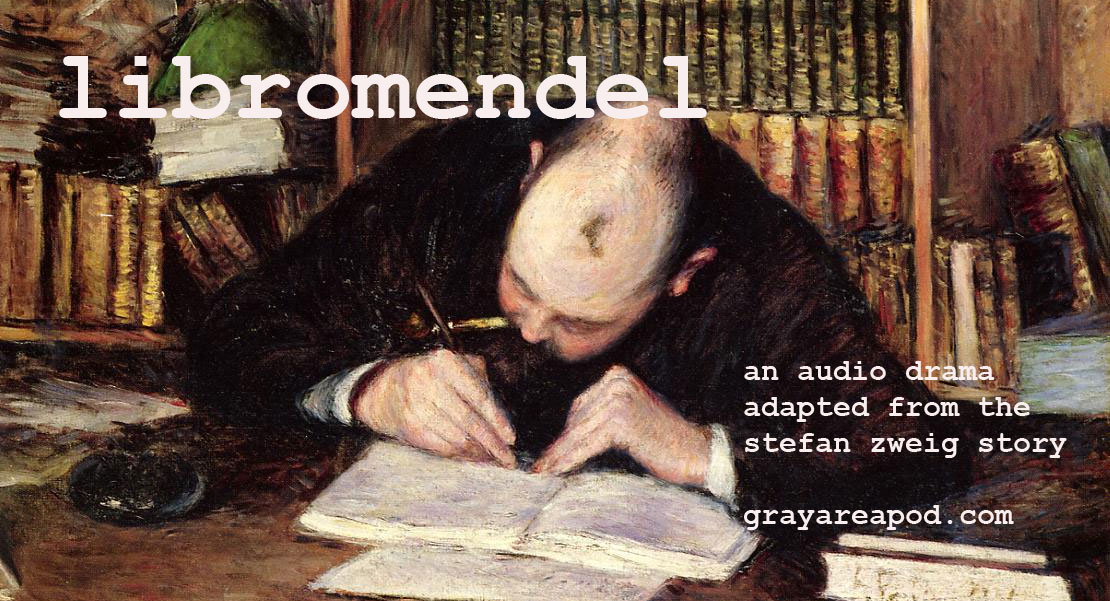[Scroll to the bottom of this post to listen to “Libromendel,” which was officially released today.]
The Making of Libromendel
When Donald Trump was elected President for a second time, like many left-leaning Americans who believe in the more salubrious possibilities of our great democratic experiment, I entered a one week period of heavy depression. Our nation was finished. Trump was going to destroy most of the essential framework that had previously been considered sacrosanct. And he proceeded to do so not long after his chainsaw-happy billionaire handmaiden gave a Nazi salute at his inauguration. The terra firma beneath us had permanently shifted for the worse.

At some point in late November, I defiantly slapped myself out of my melancholic stupor. I concluded that it was far more important to live as a bold and fearless artist rather than “obeying in advance” (to use Timothy Snyder’s term of art). This need to fight back with all the creative ordnance I had in the depot became even more apparent after ABC’s egregious surrender to Trump and Paramount’s equally cowardly folding with the 60 Minutes settlement. Why was everyone caving? Outside of the South Park Season 27 premiere depicting Trump in coitus with Satan, why weren’t America’s truth tellers rising to the occasion? Were they too shellshocked? Too set on sustaining the Faustian bargain of a career in corporate media? (One prerelease listener of significant literary influence told me that, while he loved and admired “Libromendel,” he feared that publicly mentioning it would result in professional repercussions. The stolid climate of fear extends even to ostensibly “liberal-minded” thinkers. But I’m not sorry at all. We still have a duty to resist.)
I’ve always felt that one of art’s foremost duties is to stick up for the outliers and the underdogs. And the thirty radio plays I have written and produced so far certainly attest to this tenet. For these are the people who really hold American life together. Simply depicting the complexity of human lives, with all of the attendant quirks and messiness, generally does the trick in eluding any charges of didacticism.
In May, I was finishing up a 900 page multipart script. But the unsettling torrent of soul-destroying headlines presenting us with the end of American democracy in real time beckoned a great need to create something immediate. I was haunted and horrified by the disturbing images of innocent and hard-working brown-skinned people being plucked from American life, denied habeas corpus, and sent to El Salvador without a hearing. I have a few friends and ex-lovers who are Dreamers and green card holders. When the ICE raids started to become indistinguishable from the early tactics of the Gestapo, I took it upon myself to stay in touch with them, pledging to extend any time and resources that they needed. I feared that the people whom I adored with all my heart would be permanently lost to me because of the racist and dehumanizing cruelties of the current administration.
One of these friends reminded me that I was an audio dramatist and planted a seed. She told me that I had the obligation and the creative cojones to “do something” with my art. Protesting at No Kings rallies simply wasn’t enough. “Ed,” she said, “you have this great knack for revealing the hard truths of how people live in ways that are strangely entertaining. Even if you whipped up something half-assed, it would probably be amazing.”
Well, I never produce any audio drama that is “half-assed.” My friend knew exactly what she was doing. And I am exceedingly grateful to her.
That’s when I realized that Stefan Zweig’s great short story, “Buchmendel,” had entered the public domain back in January and was thus fair game for adaptation.
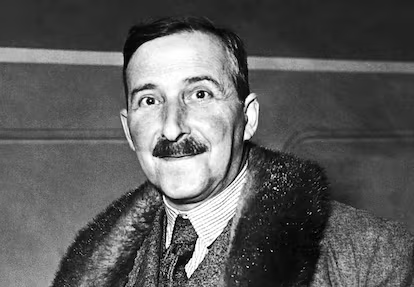 I’ve long been a Zweig fan — so much so that I once devoted two hour podcast to Zweig scholar George Prochnik and Zweig’s best translator, Anthea Bell. (Bell sadly passed away in 2018. But thankfully she was incredibly lively and happy to stump for Zweig on air.) “Buchmendel,” which deals with a Russian-Jewish immigrant falsely accused of being a traitor to Austria and ignobly sent to a concentration camp, where Mendel’s eccentric spirit is crushed by the false imprisonment and he perishes as a result.
I’ve long been a Zweig fan — so much so that I once devoted two hour podcast to Zweig scholar George Prochnik and Zweig’s best translator, Anthea Bell. (Bell sadly passed away in 2018. But thankfully she was incredibly lively and happy to stump for Zweig on air.) “Buchmendel,” which deals with a Russian-Jewish immigrant falsely accused of being a traitor to Austria and ignobly sent to a concentration camp, where Mendel’s eccentric spirit is crushed by the false imprisonment and he perishes as a result.
With the detestable deportation of Kilmar Abrego Garcia hanging in the air, that’s when I asked myself the question, “What if Mendel was Venuezuelan? And what if his name was Jaime Abrego Mendel?”
That’s when I emailed my friend Jack Ward and asked him if there was an open slot in his annual Summerstock Playhouse series. He said that there was and excitedly asked me if I had something in the works.
“Give me two months,” I replied, “and I will.”
With two people kicking my ass in the best possible way, I knew what I had to do, even if I didn’t know entirely how to go about doing it.
The Writing and the Casting
I wrote the script in one week. It spilled out of me with an intense passion and need that I could not have anticipated. The humanist in me could not stop thinking about this story. I approached the Zweig story with a twofold approach. Yes, I would use as many of the existing elements and characters as I could. But this also a production that needed to reflect 2025 American life. Many of the supporting characters from “Buchmendel” — Florian Gunther, Sporschill, the narrator (switched to a young woman), and Standhartner — all made their way into the script. I did give Sporschill more agency and a more satisfying ending. (Zweig had written this story in 1929. And one of the story’s few flaws is the regrettably regressive depiction of women.) I made Standhartner a woman as well. The “adaptation process” involved reading the story twice and taking notes and then completely discarding the source material, never looking back as I allowed my imagination to run rampant. (The careful listener will spot callouts to other Zweig works such as The Royal Game and The World of Yesterday.)
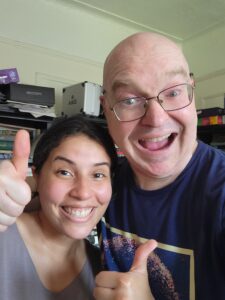 I wanted to include as many of my regular actors as I could. So the story itself became extremely large. I needed to cast two dozen actors for this. And fast.
I wanted to include as many of my regular actors as I could. So the story itself became extremely large. I needed to cast two dozen actors for this. And fast.
Much to my surprise, everyone I asked (with the exception of one actor who had retired from doing other projects) said yes. When the great Melissa Medina said yes to the character of ICE Officer Ramirez, I rewrote an intense six minute scene specifically for her sui generis talents. (I had originally imagined Ramirez as a Lt. Castillo-style character played by a young Edward James Olmos. But when Melissa expressed interest, I changed the role to a woman.)
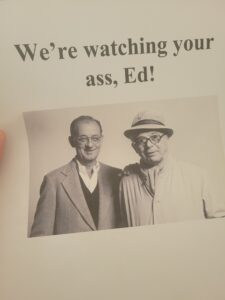 The other major influence on the script was Billy Wilder’s The Apartment. Just before writing the script, I saw a 4K restoration of this masterpiece at Film Forum and was extremely surprised when I found myself leaving the theatre in tears. I had seen the movie a good dozen times before, but it had never looked and felt as great as it did that afternoon. I printed out a picture of writers I.A.L. Diamond and Billy Wilder and taped it to my wall, adding the caption, “We’re watching your ass, Ed!” My feeling was that, if I could come even half as close to The Apartment‘s impeccable narrative structure, then I’d get someplace solid.
The other major influence on the script was Billy Wilder’s The Apartment. Just before writing the script, I saw a 4K restoration of this masterpiece at Film Forum and was extremely surprised when I found myself leaving the theatre in tears. I had seen the movie a good dozen times before, but it had never looked and felt as great as it did that afternoon. I printed out a picture of writers I.A.L. Diamond and Billy Wilder and taped it to my wall, adding the caption, “We’re watching your ass, Ed!” My feeling was that, if I could come even half as close to The Apartment‘s impeccable narrative structure, then I’d get someplace solid.
The Music
When it comes to my creative work, I am not someone who does anything by halves. But I also feel that it’s important to keep growing and reaching as an artist. This time around, I somehow developed the chutzpah to think that I could score all the music for this particular play.
I have always been a secret musician. I love music. I have played in bands. I have busked the subways and, about a year ago, once earned a little under two hundred dollars in three hours performing a few of my silly songs. There is a secret bar I regularly go to in which I am karaoke royalty and find myself hit with free drinks and unanticipated attention from eyelash-batting beauties. I have composed a few podcast themes and a few other audio drama projects. But I had never fully scored any audio drama. And the time had come to level up.
I realized that it was logistically impossible for me to score all the jazz and rockabilly tracks playing in Cafe Gluck. So I licensed all those tracks. But that still left me with about fifteen music cues to score.
The full soundtrack poured out of me in a week and a half. I composed the last three music cues in a feverish sixteen hour period in which I forgot to eat. On the music front, I am extremely indebted to my buddy Russ Marshalek, who patiently listened to all the music cues (even the rejects) and knew exactly when to give me shit and when to encourage me. (I often find that my work becomes better when I have extremely tough customers willing to fillet and pillory me at the drafting phase.)
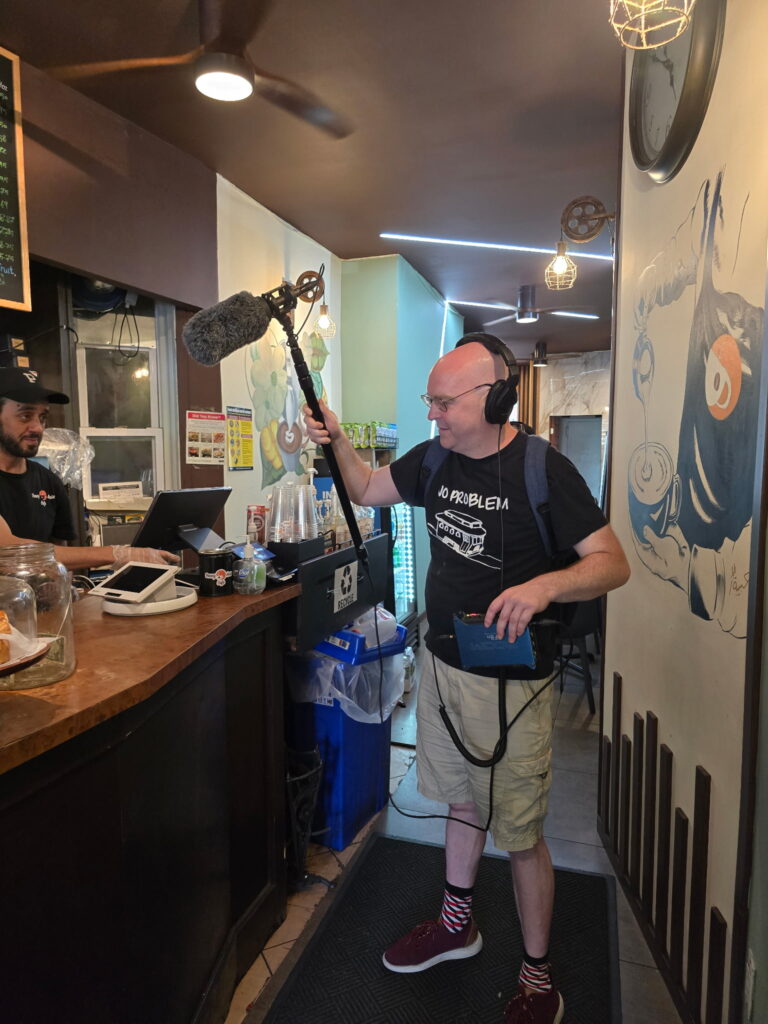
The Sound Design
For every audio drama I produce, I try to record as many original sound effects as I can. The considerable summer rains here in New York, which involved me sticking my boom mic out of my window and wandering around during any downpour to record anything that sounded interesting, gave me several hours of rain and splashing sounds to pull from. (Sadly, I was never able to get any decent thunder sound. So I had to resort to an FX library.)
Since Cafe Gluck is a particularly dominant part of the story, I went out of my way to create the thickest and densest and most realistic soundscape that I could. (“Libromendel” had 332 tracks, a new record for me.) The good folks at Penny House Cafe were kind enough to turn the radio and TV off and let me stick around for about twenty minutes recording various beverage sounds and thumps and grinds from coffeemakers. These sounds represented the close layer of the mix. (I always imagine the microphone as a kind of “camera for the ear” and “positioned” it close to the counter.) There was an additional background layer that was assembled from recordings I made at other cafes.
Putting It Together
I have long been frustrated by current sound mixing on film and television. In the quest to be “as loud as possible,” many sound mixers simply allow the music and the explosions to blow out the dialogue. And you cannot hear what the actors are saying. For “Libromendel,” I tried out a new aggressive top-down dialogue approach. I leveled the dialogue (preserving as much dynamic range as possible), placed it at the high points of the mix, and then use any open spectrum that was remaining for sound design and music. I was also far more meticulous about testing and tweaking the mix in as many monitoring environments as I could. The final day of mixing involved yours truly listening to the mix on three separate pairs of shitty earbuds and tweaking levels accordingly. And because the performances were far more sophisticated and layered this time around, the sound design essentially involved me serving as a bagman for what the actors brought. I also took greater liberties with the script than I had before, introducing two Tucker & Friends segments that were not in the script to provide a more seamless transition between scenes. I also listened far more carefully to my actors than I usually did. There is one seductive sound design move involving an analog telephone that was also not in the script, but that came because I discovered that Mendel and Standhartner were flirting with each other during the scene. (I had no idea that this was the case until we recorded!)
While the experience of making “Libromendel” exhausted me, I had a great deal of fun putting this together. And I am grateful beyond words to the thirty-five people (some of whom wish to remain anonymous) who were deeply instrumental to making this show happen.
“Libromendel” is the only production to my knowledge that has offered a direct response to the last six months of authoritarian terror. It is my great hope that it won’t be the last. You can listen to the show below.
The Show
Synopsis: During an unspecified “government transition” in the near future, the young scholar Alejandra Cortez (no relation to AOC) returns home from Rhinebeck on an extremely rainy night and stumbles into a West Village café where she was once a regular during the Second Trump Administration. But aside from the rowdy RPG players, what happened to all the colorful eccentrics? Why does nobody remember the history of Café Gluck aside from an overworked barista named Sporschill? Who is the strange new owner claiming to be a “crypto king”? And why doesn’t anybody remember the charming and eccentric old bookseller Jaime Abrego Mendel who set up shop in the adjacent card room every day? This full-cast 332 track standalone epic examines the true human cost of removing vital figures from American life. (Running time: 54 minutes)
Written, produced, and directed by Edward Champion
Adapted from the short story “Buchmendel” by Stefan Zweig
Original music soundtrack by Edward Champion
(You can listen to the soundtrack on YouTube. Subscribe to @finnegansache.)
CAST:
Alejandra: Belgys Felix
Mendel: Wolf Reigns
Florian: Zack Glassman
Standhartner: Sally Maitland
Sporschill: Julie Chapin
Ramirez: Melissa Medina
Dirks: Luvelle Pierre
Tallis: Jack Ward
Becky: Emily Carding
ICE Officer: Will Billingsley
ICE Officer #2: Frank Romeo
Felicia/The Radio: Samantha Jo
Clueless Customer: Glenn Kenny
The New Yorkers: Heath Martin and Pauly Sinatra
Boris: Pete Lutz
DM: Dr. Implausible
The Staffers: Ella Gans and Jay Silver
Victim: Zoraya Christian
Exuberant Customer: Lokia Rockwell
Café Patron: Laura Spear
and Edward Champion as The Assassin.
This is a co-production of The Sonic Society and The Gray Area.
Café songs licensed through Epidemic Audio
Editing, sound design, mixing, foley recording, engineering, and mastering courtesy of an eccentric bald man in Brooklyn who buys and reads far too many books
Special thanks to Jack Ward, Russ Marshalek, Laura Spear, Spacebar Recording, and Penny House Café for their incredible generosity and support during the making of this production.
This production is dedicated to the many innocent and hardworking immigrants in the United States who are presently facing some of the most disturbing authoritarianism in this nation’s history, as well as the late beloved bookseller Michael Seidenberg.
Listen: Play in new window | Download
© 2025, Edward Champion. All rights reserved.
